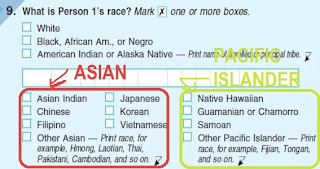Defining Pacific Islander as an Islander - PART I

After reading the article, "4 Myths About Pacific Islanders BUSTED" I must say that the majority of the article was on-point with the exception of this strand:
However, there are those who argue that the Philippines have more historical and genetic kinship with other Pacific Islanders than Asians and that Filipinos thus should be classified as Pacific Islanders.
There are plenty of reasons Filipinos are defined as Asian. They are Asian.
Pacific Islanders finally have a voice in determining who they are, and the Census Bureau actually took our voices, culture, language, and history into account - not letting another larger group - Asians - define us. And Filipinos, while ethnically diverse like many former European colonies, are without a doubt Asian, indigenous to Asia. There is a cultural and ethnic gap there and it's not debatable based on which ethnic group seems more fashionable at the moment.
Here's the real definition of a Pacific Islander by Pacific Islanders:
POLYNESIA The islands scattered across a triangle covering the east-central region of the Pacific Ocean. The triangle is bounded by the Hawaiian islands in the north, New Zealand in the west, and Easter Island in the east. The rest of Polynesia comprises Samoa (American Samoa and Western Samoa), the Cook Islands, French Polynesia (Tahiti and The Society Islands, Marquesas Islands, Austral Islands, and the Tuamotu Archipelago), Niue Island, Tokelau and Tuvalu, Tonga, Wallis and Futuna, and Pitcairn Island.
MELANESIA The island of New Guinea, the Bismarck and Louisiade archipelagos, the Admiralty Islands, and Bougainville Island (which make up the independent state of Papua New Guinea), the Solomon Islands, the Santa Cruz Islands (part of the Solomon Islands), New Caledonia and Loyalty Islands, Vanuatu (formerly New Hebrides), Fiji, Norfolk Island, and various smaller islands.
MICRONESIA The islands of Kiribati, Guam, Nauru, the Commonwealth of the Northern Mariana Islands (CNMI), the Republic of the Marshall Islands, the Republic of Palau, and the Federated States of Micronesia (Chuuk, Kosrae, Pohnpei and Yap, all in the Caroline Islands).
As a Micronesian - and one can argue the Western construct of Asians as well regarding international boundaries - it's incredibly offensive that anyone would condone this brand of cultural hijacking. Micronesians, Melanesians, and Polynesians are groups that are not merely Western constructs, but are identified as such due to what Stacy Nguyen stated to be "very different culturally and ethnically."
Pacific Islanders have an additional problem aside from becoming swallowed up by larger groups or ridiculous stereotypes: our culture is being treated like a fad. Filipinos are, indeed, Asian. The Philippines doesn't even touch the Pacific Ocean. To the east of the country is the Philippine Sea, not the Pacific. So there we have basic geography covered.
When it comes to migration patterns, Pacific Islander history is chopped up, but like Native Americans, we left the continent of Asia thousands of years ago, while other regions in Southeast Asia and the continent as a whole had far more international contact with one another. And while many Asian groups have settled in various parts of Oceania, that doesn't make them anymore indigenous to the Pacific than a European settling on Navajo land in the US. Ever snicker at someone of European descent claiming to be a great grandchild of a "Cherokee princess?" Try listening to an Asian put a flower in their hair and call themselves Native Hawaiian simply because their parents own a condo in Waipahu. Yeah, it's that effing ridiculous.

While many former colonized countries struggle to rediscover identity, calling oneself Pacific Islander without any factual grounds is not just absurd, it's incredibly insulting. My culture, ethnicity, heritage is not a trendy scarf to wear when it's convenient. As someone who is a Pacific Islander who is very well aware of my own identity, one should think about defining someone else's race for them when they have no authority to do so. Ahem, Stacy Nguyen.
In another post, I will delve further into why statistics are important to monitor when it comes to ethnicity in addition to citing more figures as to why this needs to be studied. This is not simply about being more sensitive or politically correct, it's about piecing together a puzzle of old problems resulting from colonialism and finding solutions through data collection and analysis. You can't resolve colonial illnesses correctly unless you've identified the symptoms and treat them accordingly - whether it's a dying language or high suicide and dropout rates. Ultimately, we can all hope that even in spite of irreparable damage to ancient civilizations, that we can move on and heal from centuries of dehumanization. However, we mustn't be deterred by others who are either bent on hijacking our culture or defining our identity for us.
Published on March 20, 2013 10:34
No comments have been added yet.



